Yvette Guilbert is a Actor French born on 19 january 1865 at Paris (France)
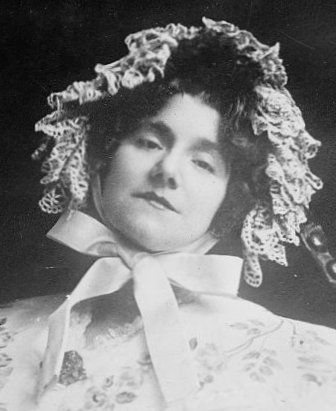
Yvette Guilbert (20 January 1865 in Paris – 3 February 1944 in Aix-en-Provence) was a French cabaret singer and actress of the Belle Époque.
"One evening Lautrec came up to the rue Ravignan to tell us about a new singer, a friend of Xanrof, who was to appear at the Moulin Rouge for the first time... We went; a young girl appeared, of virginal aspect, slender, pale, without rouge. Her songs were not virginal – on the contrary; but the frequenters of the Moulin were not easily frightened; they stared bewildered at this novel association of innocence with Xanrof's horrific double entente; stared, stayed and broke into delighted applause."
For her act, she was usually dressed in bright yellow with long black gloves and stood almost perfectly still, gesturing with her long arms as she sang. An innovator, she favored monologue-like "patter songs" (as they came to be called) and was often billed as a "diseuse" or "sayer." The lyrics (some of them her own) were raunchy; their subjects were tragedy, lost love, and the Parisian poverty from which she had come. During the 1890s she appeared regularly alongside another star of the time, Kam-Hill, often singing songs by Tarride. Taking her cue from the new cabaret performances, Guilbert broke and rewrote all the rules of music-hall with her audacious lyrics, and the audiences loved her. She was noted in France, England, and the United States at the beginning of the twentieth century for her songs and imitations of the common people of France.
She was a favorite subject of artist Henri de Toulouse-Lautrec, who made many portraits and caricatures of Guilbert and dedicated his second album of sketches to her. Sigmund Freud attended performances, including one in Vienna, and called her a favorite singer. George Bernard Shaw wrote a review highlighting her novelty.
The reviews were not all positive. The playwright and songwriter Maurice Lefèvre said of her,
Let's enter the Chanson Moderne. There she is! Long leech, sexless! She crawls, creeps with hissings, leaving behind the moiré trail of her drool... On both sides of the boneless body hang, like pitiful wrecks, tentacles in funereal gloves. For she will, indeed, lead the burial of our Latin race. Complete negation of our genius... Poor little Chanson, faithful mirror in which men reflect themselves, are you responsible for their hideousness?"
In 1895 she married Dr M. Schiller. Guilbert made successful tours of England and Germany, and the United States in 1895–1896. She performed at Carnegie Hall in New York City. Even in her fifties, her name still had drawing power and she appeared in several silent films (including a star turn in F. W. Murnau's Faust). She also appeared in talkies, including a role with friend, Sacha Guitry. Her recordings for La Voix de Son Maitre include the famous "Le Fiacre" as well as some of her own compositions such as "Madame Arthur." She accompanied herself on piano for some numbers.
She once gave a performance for the Prince of Wales, later King Edward VII, at a private party on the French Riviera. Hostesses vied to have her at their parties.
In later years, Guilbert turned to writing about the Belle Époque and in 1902 two of her novels (La Vedette and Les Demi-vieilles) were published. In the 1920s there appeared her instructional book L'art de chanter une chanson (How to Sing a Song). She also conducted schools for young girls in New York and Paris.
Guilbert became a respected authority on her country's medieval folklore and on 9 July 1932 was awarded the Legion of Honor as the Ambassadress of French Song.
Yvette Guilbert died in 1944, aged 79. She was interred in the Père Lachaise Cemetery in Paris.
Twenty years later her biography, That Was Yvette: The Biography of a Great Diseuse by Bettina Knapp and Myra Chipman (New York: Holt, Rinehart & Winston, 1964) was released.
Source : Wikidata
Yvette Guilbert

Birth name Emma Laure Esther Guilbert
Nationality France
Birth 19 january 1865 at Paris (France)
Death 3 february 1944 (at 79 years) at Aix-en-Provence (France)
Nationality France
Birth 19 january 1865 at Paris (France)
Death 3 february 1944 (at 79 years) at Aix-en-Provence (France)
Biography
Born into a poor family as Emma Laure Esther Guilbert, Guilbert began singing as a child but at age sixteen worked as a model at the Printemps department store in Paris. She was discovered by a journalist. She took voice and acting lessons on the side that by 1886 led to appearances on stage at smaller venues. Guilbert debuted at the Variette Theatre in 1888. She eventually sang at the popular Eldorado club, then at the Jardin de Paris before headlining in Montmartre at the Moulin Rouge in 1890. The English painter William Rothenstein described this performance in his first volume of memoirs:"One evening Lautrec came up to the rue Ravignan to tell us about a new singer, a friend of Xanrof, who was to appear at the Moulin Rouge for the first time... We went; a young girl appeared, of virginal aspect, slender, pale, without rouge. Her songs were not virginal – on the contrary; but the frequenters of the Moulin were not easily frightened; they stared bewildered at this novel association of innocence with Xanrof's horrific double entente; stared, stayed and broke into delighted applause."
For her act, she was usually dressed in bright yellow with long black gloves and stood almost perfectly still, gesturing with her long arms as she sang. An innovator, she favored monologue-like "patter songs" (as they came to be called) and was often billed as a "diseuse" or "sayer." The lyrics (some of them her own) were raunchy; their subjects were tragedy, lost love, and the Parisian poverty from which she had come. During the 1890s she appeared regularly alongside another star of the time, Kam-Hill, often singing songs by Tarride. Taking her cue from the new cabaret performances, Guilbert broke and rewrote all the rules of music-hall with her audacious lyrics, and the audiences loved her. She was noted in France, England, and the United States at the beginning of the twentieth century for her songs and imitations of the common people of France.
She was a favorite subject of artist Henri de Toulouse-Lautrec, who made many portraits and caricatures of Guilbert and dedicated his second album of sketches to her. Sigmund Freud attended performances, including one in Vienna, and called her a favorite singer. George Bernard Shaw wrote a review highlighting her novelty.
The reviews were not all positive. The playwright and songwriter Maurice Lefèvre said of her,
Let's enter the Chanson Moderne. There she is! Long leech, sexless! She crawls, creeps with hissings, leaving behind the moiré trail of her drool... On both sides of the boneless body hang, like pitiful wrecks, tentacles in funereal gloves. For she will, indeed, lead the burial of our Latin race. Complete negation of our genius... Poor little Chanson, faithful mirror in which men reflect themselves, are you responsible for their hideousness?"
In 1895 she married Dr M. Schiller. Guilbert made successful tours of England and Germany, and the United States in 1895–1896. She performed at Carnegie Hall in New York City. Even in her fifties, her name still had drawing power and she appeared in several silent films (including a star turn in F. W. Murnau's Faust). She also appeared in talkies, including a role with friend, Sacha Guitry. Her recordings for La Voix de Son Maitre include the famous "Le Fiacre" as well as some of her own compositions such as "Madame Arthur." She accompanied herself on piano for some numbers.
She once gave a performance for the Prince of Wales, later King Edward VII, at a private party on the French Riviera. Hostesses vied to have her at their parties.
In later years, Guilbert turned to writing about the Belle Époque and in 1902 two of her novels (La Vedette and Les Demi-vieilles) were published. In the 1920s there appeared her instructional book L'art de chanter une chanson (How to Sing a Song). She also conducted schools for young girls in New York and Paris.
Guilbert became a respected authority on her country's medieval folklore and on 9 July 1932 was awarded the Legion of Honor as the Ambassadress of French Song.
Yvette Guilbert died in 1944, aged 79. She was interred in the Père Lachaise Cemetery in Paris.
Twenty years later her biography, That Was Yvette: The Biography of a Great Diseuse by Bettina Knapp and Myra Chipman (New York: Holt, Rinehart & Winston, 1964) was released.
Usually with
Filmography of Yvette Guilbert (8 films)
Actress
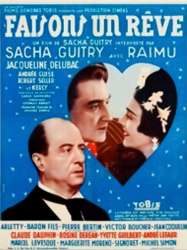
Let's Make a Dream (1936)
, 1h20Directed by Sacha Guitry
Origin France
Genres Comedy, Romance
Themes Théâtre, Films based on plays
Actors Sacha Guitry, Raimu, Jacqueline Delubac, Andrée Guize, Robert Seller, Michel Simon
Roles Un Invité (Prologue)
Rating69%





Un avocat séduit une femme mariée et passe la nuit avec elle. Le lendemain matin, le mari arrive au bureau de l'avocat affolant l'épouse infidèle, cachée dans la salle de bain, mais sans raison : lui aussi a découché et sollicite un alibi.
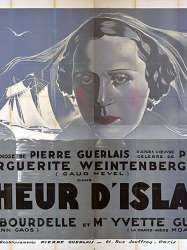
Iceland Fisherman (1934)
Directed by Pierre Guerlais
Origin France
Themes Seafaring films, Transport films
Actors Thomy Bourdelle, Yvette Guilbert, Marguerite Weintenberger, Albert Broquin, Yvonne Yma, Gaston Mauger
Roles la grand-mère

The Two Orphans (1933)
, 1h27Directed by Maurice Tourneur
Origin France
Genres Drama, Melodrama
Themes Théâtre, Films based on plays
Actors Renée Saint-Cyr, Rosine Deréan, Jean Martinelli, Pierre Magnier, Emmy Lynn, Yvette Guilbert
Roles La Frochard
Rating68%





Au début du XIX siècle, l’orpheline Henriette Gérard accompagne Louise, sa sœur adoptive aveugle, à Paris. Les deux jeunes filles espèrent bien trouver un médecin qui guérira Louise de sa cécité. Hélas, Henriette est enlevée par le marquis de Presles, un roué qui a décidé d'en faire son jouet. Louise n'a pas plus de chance que sa sœur : livrée à elle-même, elle tombe dans les mains de la mère Frochard, une mégère alcoolique qui ne cessera de l'humilier et de la tourmenter pour la forcer à mendier. Tout paraît s'arranger avec l'intervention du chevalier de Vaudrey et de la comtesse de Linières…

Laissez faire le temps (1932)
, 21minutesOrigin France
Genres Comedy
Actors Robert Arnoux, Christiane Delyne, Yvette Guilbert, Pierre Moreno

La Dame d'en face (1932)
Directed by Claude Autant-Lara
Origin France
Genres Comedy
Actors Yvette Guilbert, Christiane Delyne, Pierre Moreno

L'Argent (1928)
, 3h15Directed by Marcel L'Herbier
Genres Drama, Romance
Actors Pierre Alcover, Brigitte Helm, Marie Glory, Henry Victor, Alfred Abel, Antonin Artaud
Roles La Méchain
Rating74%





Saccard and Gunderman are rival Paris bankers. Saccard sees an opportunity to rescue his failing bank, Banque Universelle, by financing the solo transatlantic flight of Jacques Hamelin, a pioneering aviator, and then capitalising on his popularity to set up a colonial business project in Guyane. He also hopes to seduce Hamelin's wife Line in his absence. When a rumour circulates that Hamelin has crashed, Saccard exploits the false reports to manipulate shares at the Bourse.
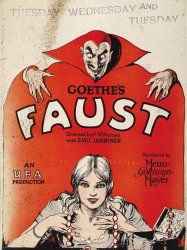
Faust (1926)
, 1h40Directed by Friedrich Wilhelm Murnau
Genres Drama, Science fiction, Fantasy, Horror
Themes Poésie, Films about religion, Demons in film, Adaptation d'un poème, Films based on plays
Actors Gösta Ekman, Sr., Emil Jannings, Camilla Horn, William Dieterle, Frida Richard, Yvette Guilbert
Roles Marthe Schwerdtlein
Rating80%





The demon Mephisto has a bet with an Archangel that he can corrupt a righteous man's soul and destroy in him what is divine. If he succeeds, the Devil will win dominion over earth.
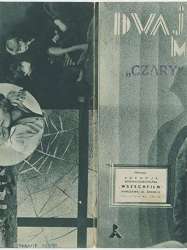
Les Deux Gosses (1924)
Directed by Louis Mercanton
Origin France
Actors Yvette Guilbert, Jean Mercanton, Gabriel Signoret, Carlyle Blackwell, Édouard Mathé, Louis Kerly
Roles Zéphyrine
 Connection
Connection


